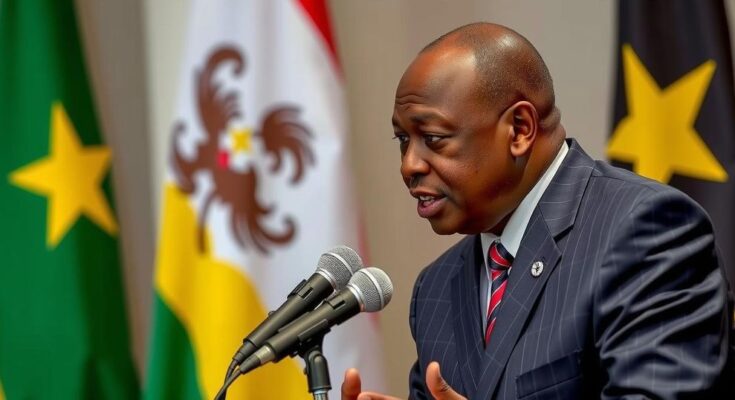President Salva Kiir of South Sudan pledged to accelerate the Tumaini peace negotiations, clarifying that these talks are intended to complement the existing Revitalized Peace Agreement. He highlighted the necessity for political readiness for upcoming elections while addressing humanitarian challenges in the country. The need for collaborative efforts among state and national leaders to ensure effective aid access is crucial as South Sudan navigates its path toward lasting peace.
President Salva Kiir Mayardit of South Sudan affirmed his commitment to the Tumaini peace negotiations with hold-out groups, clarifying that these discussions aim not to create a new parallel agreement but to supplement the current Revitalized Peace Agreement. Speaking at the 8th annual Governor’s Forum in Juba, he expressed the need for a collective vision that addresses the concerns of dissenting factions. If a new agreement were to replace the existing one, it would undermine inclusivity and perpetuate conflict.
To expedite the negotiation process, President Kiir announced a restructuring of the government delegation for the Tumaini talks. Nicholas Haysom, the Special Representative of the Secretary-General and Head of the United Nations Mission in South Sudan, noted the regrettable necessity of extending the transitional period by two years and delaying elections due to a lack of advances in implementing key elements of the peace agreement. He emphasized the importance of a realistic work plan to guide the next two years and called for urgency in fulfilling commitments to the South Sudanese people.
President Kiir encouraged political aspirants to prepare for the elections scheduled for December 2026, emphasizing that the two-year preparation period is manageable. Haysom reiterated that there exists a collective desire among the South Sudanese leadership and populace for a peaceful and resilient future. He urged state leaders to focus on delivering basic services and addressing the root causes of conflict.
The ongoing humanitarian crisis in South Sudan necessitates an effective collaboration among national and state leaders to improve access for aid organizations. The Deputy Special Representative, Anita Kiki Gbeho, highlighted the challenges faced by humanitarian efforts, calling for clear measures to ensure unobstructed access to aid for those in need. The Governor’s Forum serves as a crucial platform for national and state leaders to discuss pressing security and economic issues while fostering collaboration on implementing the peace agreement.
The Tumaini peace negotiations are part of ongoing efforts to create a stable political environment in South Sudan, following years of civil unrest. The 2018 Revitalized Peace Agreement was designed to foster inclusivity among the various factions in the country. The current negotiations seek to involve hold-out groups that have not yet signed the agreement. The challenges surrounding the humanitarian situation in South Sudan are exacerbated by the need for political stability, making these discussions essential for the nation’s future.
In conclusion, President Salva Kiir’s commitment to the Tumaini peace negotiations reflects the South Sudanese government’s dedication to fostering a cohesive political environment. The involvement of all factions, alongside the urgent need for humanitarian support and the delivery of services, highlights the complexities of building lasting peace. Moving forward, a collaborative approach involving national and state leaders will be crucial in addressing these challenges and fulfilling the promises made to the South Sudanese people.
Original Source: www.socialnews.xyz




